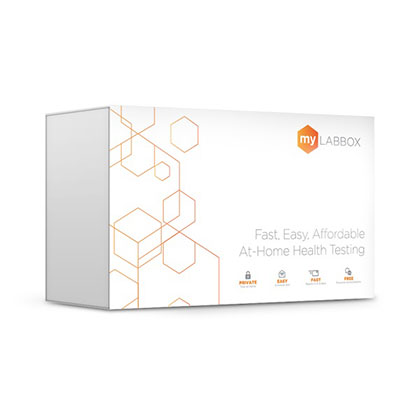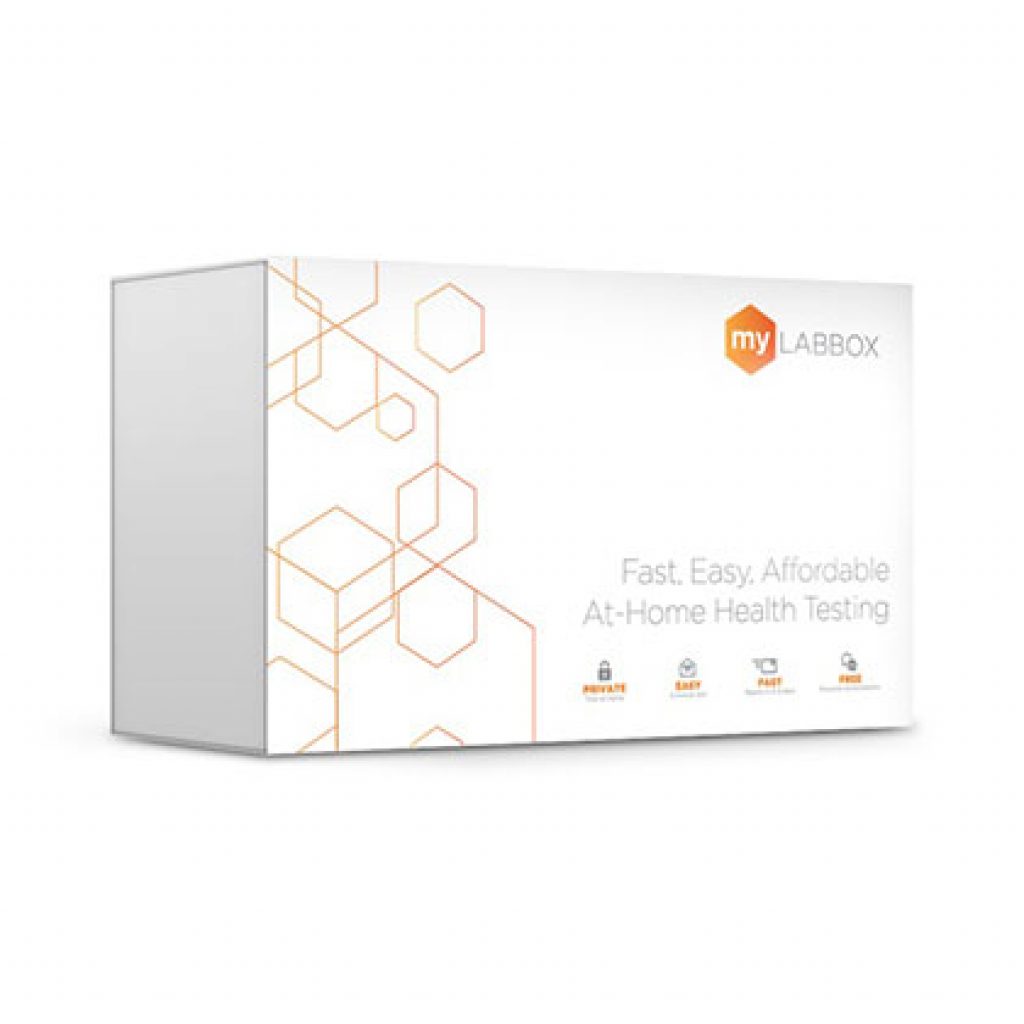If you've been actively trying to conceive or have had unprotected sex without getting pregnant for longer than 12 months, seeking a fertility test from a fertility clinic or a healthcare practitioner should be something you seriously consider if you're worried about your fertility health.
Checking your fertility from home
At-home Testing
There are however some at-home fertility testing methods for women and men that might help pinpoint the cause of the concerns in your reproductive health. In most cases, these are tests from blood samples, sperm samples, or urine samples and they come with professional medical advice from registered healthcare professionals.
Seeking an at-home test is a responsible way of taking action if you're having trouble conceiving. It's one of many methods that can you choose to investigate reproductive problems and is very easy and discrete.

myLAB Box – Ovulation Test
The At-Home Ovulation Confirmation Test provides you with a comprehensive view of your current Progesterone levels in order to better understand your fertility.
$32.00

myLAB Box – Ovarian Reserve Test
The At-Home Ovulation Test provides you with a comprehensive view of your current Progesterone levels in order to better understand your fertility.
$99.00
Read our myLAB Box review for information and opinions on tests and services.
It's quite common for couples to experience difficulties getting pregnant and there are lots of variables that need to be ruled out when investigating. Fertility is often regarded as our ability to produce sperm and eggs that are healthy enough to conceive.
However, there are often more environmental factors that can also affect the body's ability to conceive, grow and birth a baby even when the production of eggs and sperm is enough to start that process.
Female Hormone Levels
Hormones are signal carriers of the human body and can be tested for many reasons, as they hint at the state of your current health and wellness. It's important to understand that they are clues and for that reason, at-home fertility testing for Females involving the measurement of hormones (mainly from the pituitary gland), can not replace the in-depth analysis and thorough fertility testing that you get from a professional healthcare practitioner.
A female at-home fertility test can come in different bundled test panels, most of which are a collection of female hormone levels tests. The hormones or biomarkers (the ‘things' being tested) in each test and not absolute indicators of fertility. They are natural contributors to fertility but these tests do not directly diagnose any specific issue. They look for imbalanced hormones which can be a clue as to why you're struggling to conceive. They can also be a sign of other health concerns, so once again consider these test results as clues or hints you won't get positive or negative results for anything specific, results come in the form of levels, like high, low normal and so on.
Ovarian Reserve Tests
There are different types of ovarian reserve tests aimed at measuring the hormone levels present during the various reproductive cycles and ovarian function. These hormone levels fluctuate around times of ovulation, during the menstrual cycle and during all stages of pregnancy.
The ovarian reserve testing panels measure the key hormones that are released before and during ovulation, which can help estimate the number of available eggs based on the levels of hormones released to support the processes. A diminished ovarian reserve will likely result in an adverse test outcome and can highlight issues with general ovarian function.

Ovarian Reserve: AMH Test
One of the more reliable tests (although still not conclusive) is an ovarian reserve test which measures your Anti-Mullerian Hormone levels (AMH), it is not a precise yes or no result, but does give you the hormone range that is used to estimate the number of eggs in your reserve.
The egg follicles (the pouches around the egg) in the ovary, secrete Anti-Mullerian Hormone. An AMH test measures the hormone levels in your blood which is a useful indicator of how many eggs are in the ovary. The higher the levels of AMH in the blood, the more eggs are present and available for conception – if they are healthy.
Patients seeking reproductive support will be given an AMH test and the results will help their healthcare practitioner determine the scale of support required.
You can buy at-home AMH tests from a number of online retailers either as single at-home ovarian reserve tests or as part of a broader at-home female home test bundle.
Ovarian Reserve: FSH Test
FSH made in the pituitary gland pretty much does as its name suggests, for women, it helps stimulate the growth and release of the follicle and egg during ovulation. It's an integral part of ovulation and your menstrual cycle, should the egg remain unfertilized. For men, it helps in the production of sperm although it's less reliable as a male fertility test than a sperm count test.
For women, measuring their FSH levels can once again offer hints as to the health of their reproductive system. The hormone itself is part of a balanced process, so normal test results can indicate a healthy system whereas high or low levels suggest the hormone isn't working at its optimum level.
If you are having difficulties conceiving, an at-home FSH test or a test bundle that includes FSH as a biomarker will help you understand more about the hormone levels that are contributing to the process of reproduction. You can use these results to highlight concerns that you may have with a healthcare professional and progress on to a pathway of fertility support.
Ovarian Reserve: LH Test
Luteinizing hormone (LH) also made in the pituitary gland along with FSH is vital for reproduction, specifically the regulation of ovulation, your menstrual cycle and egg maturation.
A luteinizing hormone test can assist in the diagnosis of issues related to ovulation, if you're not getting periods or you're struggling to conceive it is often performed alongside these other listed fertility related tests to help uncover. It won't diagnose anything specific, but the results in the form of levels are clues to various reproductive health issues.
Most at-home testing companies package the LH test in with other bundled test kits either as a blood test or a urine test. You are likely to find it as part of a fertility test panel alongside FSH & Estradiol.
Estradiol
The structure and stability of the female reproductive system is secured by the release of estradiol. It is responsible for the health and maintenance of all the systems involved in reproduction, think of it as the hormone that keeps everything strong, growing and in the best shape required to conceive and carry a baby.
It acts as a growth hormone for the reproductive organs like the vagina, the fallopian tubes, the endometrium and cervical glands. It is needed for ovulation, for the mental cycle and during pregnancy, among other important functions.
It's such a diverse hormone that adverse test results should be interpreted in communication with a healthcare professional which many at-home testing companies will offer. An imbalance is a huge clue in the discovery of infertility, but can also indicate other issues unrelated to reproductive health.

myLAB Box
At-Home Female Fertility Test
Estradiol
Luteinizing Hormone (LH)
Follicle Stimulating Hormone (FSH)
Testosterone
Finger Prick & Saliva Sample
$149.00
This kit will give you an indication of the balance of hormones in your samples and results will come back showing you a range for each which can be high, low or normal. These hormones are key to reproductive health like ovulation and the menstrual cycle, but can also help women discover other health risks associated with female bodily functions.
Read our myLAB Box review for information and opinions on tests and services.
Progesterone
Progesterone is produced in the ovaries in preparation for pregnancy. It has many functions most of which help in the growth and birth of the baby from a fertilized egg.
One of its core functions is to help the uterus prepare to hold a fertilized egg, so an imbalance of progesterone might be the cause of reproductive issues post fertilization.
Its a good indicator of fertility and can be measured to tell if the patient is ovulating properly as progesterone is released as part of the process.
You probably won't test progesterone on its own if you're investigating fertility issues. It will normally be performed along with other hormone tests listed above as this test is designed to highlight potential problems in
Male Fertility
Male fertility testing is in most cases a simpler process of semen analysis and to avoid doubt in the first instance these sperm analysis tests are more conclusive than testing hormones. The volume and integrity of sperm would be the best place to start looking and there are a number of great at-home mail-in sperm count tests.
These tests measure the count of sperm in the sample and the structure of the semen in an effort to analyze any issues that could be preventing fertilization during sex. It's useful to rule out sperm as the source of your reproductive problems and a mail-in sperm test is the best form of fertility check for men looking to check their fertility at home.

If the sperms and semen are in good shape, according to the test results, then it is more likely that the issues lie later on in the reproductive process. However, if the test shows that there are deficiencies in the sperm sample, then there is a good base for further investigation into the cause of those irregularities. The majority of mail-in sperm testing companies, also offer free sperm storage with their male fertility tests.
At-home male hormone tests won't give you any precise insights into your fertility, many of the hormones that are tested are helpful in the production of semen and sperm in general – so they all contribute. So a sperm analysis test is always suggested as a first step. Unlike a female hormone and fertility test, the levels of specific hormones can be linked to precise reproductive processes, in males, the same hormones can only hint at a potential issue in the production of fertile semen.
Are at-home fertility tests accurate?
At-home fertility checks generally measure hormones in your blood or urine samples. The ‘levels' in the results are interpreted based on what experts have determined over years of research. The results are never yes or no, they're always based on your hormone levels this is the recommendation.
The at-home test themselves are sent to the same labs used by professional healthcare practitioners. They are very accurate unless there are issues with equipment or samples which cause anomalies or failed tests.
Sources
progyny – Fertility Blood Tests
Image Credits
Featured Image – Photo by Djim Loic
Baby Bump – Photo by freestocks
Person Waiting – Photo by Ümit Bulut








